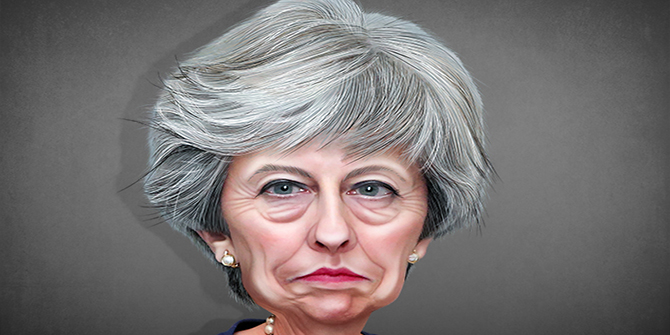 Despite the party’s 2019 defeat, Labour’s policies have much popular appeal and could demand majority support. This means that the new Labour leader should not reinvent the party and its message, like the root and branch reform that took place under Tony Blair, but rather change its image, like David Cameron ‘detoxified’ the Tories, writes Sean Kippin.
Despite the party’s 2019 defeat, Labour’s policies have much popular appeal and could demand majority support. This means that the new Labour leader should not reinvent the party and its message, like the root and branch reform that took place under Tony Blair, but rather change its image, like David Cameron ‘detoxified’ the Tories, writes Sean Kippin.
Few corpses will be better examined than Labour’s following the 2019 General Election. The emerging narrative is fairly conclusive; Labour lost because of its leadership. The party found itself on the wrong side of enough of its traditional supporters over Brexit to cause serious problems in key seats and regions. This was compounded by losing a lot of its Remain-oriented supporters to the Liberal Democrats and the Green Party. The less said about Scotland the better. Underpinning all of this was a sense that Labour’s promises were too big and ambitious to be considered credible, particularly when they were to be delivered by the current leadership.
In 1994, with the creation of New Labour, the party reached the final stages of a process that had been underway since 1983 when Neil Kinnock assumed its leadership. Slowly, he disentangled the party from the direct control of the trade unions and the radical left, and moderated its policy offer. Blair took this to the next stage, relabelling the party, and seeking to create virtue out of necessity in enthusiastically embracing centrism. In between, John Smith had overseen consequential internal reforms which gave the leadership and the Parliamentary Labour Party greater independence from its affiliates. The overall result was a comprehensive reshaping of the party, and therefore the sole viable vehicle for British social democracy. It has been suggested that the next Labour leader embark on a similar journey today, reforming the party internally, pursuing doggedly centrist policy positions, and striking a more overtly traditional and patriotic tone. Yet what is required of Labour following its latest electoral nadir is not as dramatic. David Cameron’s Conservatives, in the period from 2005 to 2015, showed that electoral success can be built upon only a modest set of policy changes when combined with a skilful playing of the political game. It goes without saying that the parallels between 1983’s Labour and today are not exact, not least because 1983’s party featured a large Trotskyite faction which was hostile to democratic governance and many of the values of the Labour Party.
So what can the new Labour leader do to enhance their party’s chances of sufficiently improving their performance at the next election. A good place to start is on striking a reassuring tone on high-profile issues which act as a proxy for patriotism. Britain’s nuclear deterrent, despite its overwhelming pointlessness, isn’t going anywhere. The new Leader should embrace renewal. This can be justified on two grounds: firstly, it creates and supports jobs in traditional Labour areas; secondly, now that Brexit – and the diminishment of international standing that goes with it – will happen, a statement that Britain seeks to retain its status as a global player will stand as a useful symbol of the new Leader’s ‘seriousness’ and ‘patriotism’.
Harold Wilson famously observed that as Leader of the Opposition he quickly ‘ran out of things to say’. The Prime Minister can pull myriad levers to project their party and government’s message and to change policy, while all the Leader of the Opposition has is his or her words. One exception to this is internal party reform. In different ways, this allowed Opposition leaders to ‘cut through’ and put their principles into concrete form. For Kinnock, Smith, and Blair (and to a lesser extent Duncan Smith and Cameron) this involved picking fights with elements of their own party. The new Leader could do the same. The apposite topic for this is antisemitism. No other form of racism would be tolerated to the same extent, and that a number of antisemites arrive at this perspective via advocacy for the Palestinian people is a complete irrelevance. The new Leader should adopt a stance so tough that it not only expels those who have expressed antisemitic sentiments, but that it also dissuades anyone of that poisonous mindset from joining the party in the first place. There is no upside, justification, or benefit to having racists in the Labour Party.
This would also help the party with its problems on leadership more broadly. Alas, Labour now has to play this game, again. Its new Leader must embody normality and convention in both associations and appearance. They must embrace media appearances and not allow themselves to feel victimised by the media more generally. ‘It’s all so unfair’ is a terrible look, and projects weakness. They must also not allow themselves to be drowned by events. For example, any observer of British politics since 2016 could see that Labour was going to end up backing a second referendum on EU membership; the underlying conditions made it inevitable. Corbyn’s mistake was to not acknowledge it, to wait too long, and in doing so to avoid laying the groundwork for the inevitable U-turn.
None of this is to suggest that Labour’s policy offer needs to change in any meaningful sense, particularly on the domestic front. Taxes on the super-rich remain popular; a shift towards a new model of ownership in the private sector remains popular; professionally-led public services remain popular; infrastructure improvement remains popular; alleviating poverty, lowering the country’s carbon emissions, fairer business practices, more and better housing, and state enforced higher wages all remain popular. Much of it is necessary. Just as consequentially, the Labour membership is highly unlikely to elect anyone who thinks otherwise. Therefore, the new Leader’s task is to strike a reassuring tone and appearance, and to find a way to sell and justify a set of policies and beliefs which represent the settled will of the Labour Party in a more savvy, skilful, and reassuring manner. It also needs to settle on one or two of the most popular to highlight, rather than presenting a smorgasbord of new nationalisations and spending cuts.
The party’s binds on Scottish independence and Brexit, which weren’t designed to drive wedges between the party and many of its traditional supporters, but may as well have been, haven’t gone away because of the 2019 election. They will continue to dominate politics on both sides of the border – probably to Labour’s detriment. However, its only hope given the settled beliefs of the membership is on seeking to shift the conversation towards policy issues, and to fight for the next five years on that terrain. What needs to change is not so much the message but the messenger and the way the message is delivered.
Upon becoming Conservative leader in 2005, David Cameron observed that when focus groups heard Conservative policies they agreed with them, but disagreed once they found out that it was the Conservatives that had proposed them. This is why his strategy was to ‘detoxify’ the Tories, rather than embark on a New Labour-style root and branch reform. What needed to change was not the policies, but the image of the organisation and its most high profile spokesperson proposing them.
None of this stopped the Conservative Party in 2010 privatising public assets, cutting taxes, restricting immigration, and reducing social security entitlements. Much of it was far more radical in nature than public opinion appreciates. When it returned to power in 2015, in control of a majority government, it organised a referendum on Britain’s EU membership. Detoxification masked the party’s true and enduring nature. Labour’s policies today have a large amount of appeal, and could demand majority support and win the party enough votes to return to power. The party does not need a wholesale reinvention, but it does now need something akin to a detoxification.
_________________
 Sean Kippin is a Lecturer in Politics in the University of Stirling’s Division of History, Heritage, and Politics. He recently completed a PhD at the University of the West of Scotland which focused on the public policy influence of the Co-operative Party during the New Labour period.
Sean Kippin is a Lecturer in Politics in the University of Stirling’s Division of History, Heritage, and Politics. He recently completed a PhD at the University of the West of Scotland which focused on the public policy influence of the Co-operative Party during the New Labour period.
All articles posted on this blog give the views of the author(s), and not the position of LSE British Politics and Policy, nor of the London School of Economics and Political Science. Featured image credit: Pixabay (Public Domain).








Sean
I very much enjoyed your article on using Cameron tactics to restore the Party given its current state.
Tangential to your paper you might like to read my paper “Whither Labour -A Framework for the Future” which appears on my site Labourbyroger.com
The emphasis is more on how we tackle the doctrine of Neo Liberalism which currently has such a grip upon the electorate.
Yours
Roger
Sean
I liked your paper and comparison with Cameron rebuilding the Conservative Party. I ,like you , believe that we have many good policies which will gestate well during the coming five years when the public have started to catch up with their future relevance.
I have also written on these matters see “Whither Labour -A Framework for the Future “ which appears in my blog Labourbyroger.com
I will be interested in any comments you may have
Roger
Sean
I liked your paper and comparison with Cameron rebuilding the Conservative Party. I ,like you , believe that we have many good policies which will gestate well during the coming five years when the public have stated to catch up with their future relevance.
I have also written on these matters see “Whither Labour -A Framework for the Future “ which appears in my blog Labourbyroger.com
I will be interested in any comments you may have
Roger
If there is any merit in the policies espoused in the labour party’s recent debacle of a manifesto, it would be that their implementation would demonstrate to yet another generation, at yet greater expense, their hopeless impracticality, allowing them to be returned once more to the dusty shelves of ancient history.
But no need; the great British public still have 2008 in their memories, Britain under a labour government engaging in a pro-cyclical government spending spree which put prudence to flight and this country at a comparative disadvantage when confronting the financial crisis which ensued in that year. Blair admitted it in his autobiography so it must be true!
It is a truism of politics, blindingly obvious, that if you ask voters ‘on the doorstep’, they will say they like free stuff, particularly when told someone else is paying.
But to get them to actually vote for such policies, you have to convince them that they will not end up footing the bill themselves, as, after 2008, they did. If this election result clearly demonstrated one thing, it is that the electorate is a great deal more sophisticated than most politicians assume. Rumbled!
The most interesting spectacle of the next few years will not be brexit. It will be the parliamentary labour party’s attempts to drag itself out of the life extinguishing mire of socialism, currently looking impossible; but if politicians are good at one thing……
Only then can Mr Jarvis, currently their only hope, finally step forward to lead them back into the land of credibility. This may take some time!
Democracy….the least worst form of government…….
The policies of the party may have seemed popular to young, university educated students but they did not speak to real people in working class towns. Free internet, taking equity in all publicly traded companies and income tax capping at £125k are not things that would help ordinary people get on with their lives. This far left project is advocation of ideology, not a manifesto for government. Even Boris Johnson understands this realpolitik, which is why he has removed unpopular fiscally conservative economic policies from the manifesto like tax cuts for the highest earners.